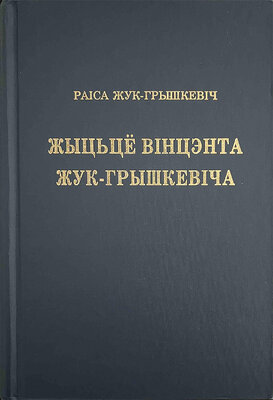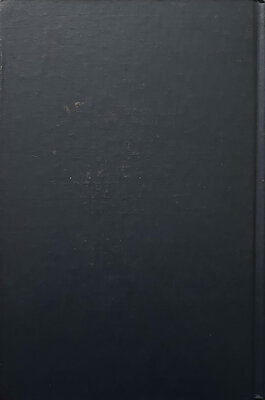Жыцьцё Вінцэнта Жук-Грышкевіча
Раіса Жук-Грышкевіч
Памер: 798с.
Таронта 1993
Як сябра Рады БНР і старшыня Сэктару Рады БНР на Канаду В. Жук-Грышкевіч апрацоўвае праект рэарганіза-цыі Рады ВНР, зьмены яе Статуту і стварэньня нацыя-нальна-палітычнай бээнэраўскай арганізацыі Лігі БНР. Праект гэты, як дыскусійны матарыял, ён прадстаўляе на 10-ай Сэсіі Рады БНР, што адбылася 13 красавіка 1968 году ў Нью Ерку. На гэтай Сэсіі др. Вінцэнт Жук-Грыш-кевіч быў выбраны першым заступнікам Старшыні Рады БНР.
Пасьля сьмерці 29 траўня 1970 году Старшыні Рады БНР інж. Міколы Абрамчыка Старшынём Рады БНР стаўся першы заступнік старшыні др. Вінцэнт Жук-Грышкевіч, а 11-я Сэсія Рады БНР 29 травеня 1971 году ў Нью Ерку абрала яго за Старшыню Рады БНР на на-
хі
ступны шасьцігадовы тэрмін. На становішчы Старшыні Рады БНР ён быў да лістапада 1982 году - амаль да 80-годзьдзя свайго жыцьця.
Апошнім асягненьнем др. В. Жук-Грышкевіча трэба ўважаць ягоны вядучы ўдзел у пабудове ў 1988 годзе, на 1000-я ўгодкі хрысьціянства ў Беларусі, Беларускага Па-мятнага Крыжа ў Сьвятыні Пакутнікаў у Мідлянд у Кана-дзе.
Аддаў сваё працавітае й творчае, ахвярнае й пакутнае жыцьцё Вінцэнт Жук-Грышкевіч на службу Бацькаўшчы-не-Беларусі, закончыў яго 14 лютага 1989 году ў Бэры ў Канадзе і заслужыў на вечную памяць. Цела яго спачы-вае на беларускім могільніку Жыровіцкае Божае Маці ў Іст Брансвіку ў ЗІПА.
Раіса Жук-Грышкевіч
хіі
INTRODUCTION
The purpose of this volume is to record the events of Vincent Zuk-Hryskievic’s life.
An integral part of his biography was the love he had for his homeland, Belarus. He believed that he had been allowed to survive the Soviet death camps in order to serve the Belaru-san cause. He regarded the declaration of Belarusan independence on March 25, 1918, as a landmark in his own life and wished it to have the same unique significance for all Belaru-sans.
Through this work an attempt has been made to survey the life and work of the Belarusan immigrant community and the network of relationships which it has developed with the Belarusan homeland through the greater part of the twentieth century. It was his wish that the Belarusan nation’s shared past could be thus recorded and preserved for the sake of the future.
The author wishes to express her gratitude to Dr. Vitaut Kipel, President of the Belarusan Institute of Arts and Sciences in the United States, Dr. Vitaut Tumash, former President of that Institute, Mrs. Zora Kipel, poet Natalia Arsiennieva, Father Alexander Nadson, Mr. Guy de Picarda, Dr. Jan Za-prudnik, Mrs. Valentina Pashkievich, Prof. Thomas E. Bird, Queens College, N.Y.C., Mrs. Rahnieda Hryskievic-Alachnovic, Messrs. Michael Jaskievich, Jan Michaluk, Michael Tulejka, Vasil Stoma, and all those who assisted in realizing this project through their advice, and material or moral support.
BIOGRAPHY
Vincent Zuk-Hryskievic played a significant role in the Belarusan independence movement of his time. His involvement included activities in pedagogy, research, social and political organizing for which he was persecuted, arrested, deported, and exiled from his homeland.
He was born on February 10, 1903, into a Catholic family in the township of Budsiau, Vialejka district, the son of Anton and Mary (пёе Chaniauka). He was the youngest of six chil-
xiii
dren, five of whom survived, Jadvinia, Jan, Michael, Branis-Іай, and Vincent.
Vincent attended elementary school in Budslau. His secondary school years were divided between Budslau and Vilna, where he graduated in 1922. That autumn he enrolled in the Charles University in Prague, where he was a student of Slavic philology and history. He received his degree in 1926, qualifying him to be a secondary school teacher. From 1927 until 1939 he taught history and literature at the Belarusan lycee in Vilna. Simultaneously he held the rank of lecturer in the Belarusan language at the Belarusan Orthodox Seminary and at the School of Higher Political Studies, both in the city of Vilna. In December 1932, he passed a national examination at Stephen Batory University in Vilna, qualifying him to teach history and Slavic philology. In both Prague and Vilna he was actively involved in community organizations and teachers’ societies and participated in the publication of several Belaru-san-language newspapers and periodicals. Having come to Canada in 1950, he matriculated at the University of Ottawa which awarded him a doctorate in July 1952 after his successful defense of a dissertation on the lyricism of Janka Kupala.
As a member of the Polish Army from 1945 to 1949, he lectured in history and psychology in Polish military schools in England and in Italy. He emigrated to Canada in 1950 and from 1951 to 1954 coordinated and conducted a series of lectures in Belarusan Studies through the University of Toronto’s extension programme.
In addition to his life-long career as a teacher and lecturer, Zuk-Hryskievic was involved in the social, educational, and political life of the Belarusan diasporan community.
When the first elections to the Polish Sejm were held in 1922, he served as the campaign director for the Brasiau and Dzisniensk regions for the Belarusan campaign committee of Vilna, promoting the minority-bloc Belarusan candidates in the Sejm and the Senate.
With the occupation of Vilna by the Soviet Army on September 30, 1939, Zuk-Hryskievic was arrested and, over a period of many months, was imprisoned in Lukiski, Bialystok, Vialejka, Miensk, Polack, and Vorsha. In 1940 he was charged with being an “anti-social element” and an “enemy of the [Soviet] people” and was sentenced to eight years at hard labour. Together with thousands of other prisoners, he was sent to the north, where he worked on the northern railroad from Kotlas xiv
to Vorkuta. In 1942 an agreement was signed between Soviet Foreign Minister Molotov and Polish General Sikorski to free Polish citizens being held in Soviet prison camps. He was released and joined the newly-formed Division of the Eighth British Army, made up of citizens of Poland. He served with this Division in Iraq, Palestine, Egypt, and later, in Italy, where he took part in the Battle of Monte Cassino.
With the cessation of hostilities in Italy, he taught history and psychology in the Polish military secondary school. It was already known that the final destination of a number of the Belarusan soldiers would be Great Britain. As he worked with these young soldiers, Zuk-Hryskievic laid the groundwork for the creation of what would become the Association of Byelorussians in Great Britain, the first organization formed in any Western country in the post-war period. Elected its first president, he directed the work of the Association into several fields and began the publication of two periodicals aimed at the Belarusan immigrant community.
Haying moved to Toronto, Ontario, Canada, in January 1950, Zuk-Hryskievic became a leading figure in Belarusan-Ca-nadian community life. He took an important role in a number of initiatives, for example, in the organization of the First Convention of Belarusans in North America, which took place at Niagara Falls, Ontario, in 1952; in the formation of the Byelorussian (Toronto) Credit Union, Limited; and in development of a lecture series on Belarusan themes at the University of Toronto.
In September 1953 Vincent Zuk-Hryskievic married Raisa Zukouskaja, a student in the Faculty of Dentistry at the University of Toronto.
In addition to his extensive activity with the community, he often represented Belarusan-Canadians at conferences and conventions such as the Centennial Planning Committee (Toronto, 1965), the Conference on Rights and Responsibilities (Port Elgin, 1966), and the Second National Conference on Canadian Slavs (Ottawa, 1967).
At this 1967 conference, Zuk-Hryskievic presented a paper on: “Belorussians and Canadian Statistics,” demonstrating that official statistics had drastically under-represented that group. According to data which he marshalled, he proposed a conservative estimated that over 50,000 Canadians were of Belarusan origin.
For a period of two years, Zuk-Hryskievic moved to Munich, Germany, at the invitation of Mikola Abramcyk. Here
xv
Vincent established and managed the Belarusan section of Radio Liberty. He made the first broadcast to his homeland on May 20, 1954, and remained with the programme until April 1956 when he returned to Toronto.
In Canada he resumed his involvement in community affairs. Among the first projects which he undertook was assisting Dr. V. J. Kaye in preparing his essay, “Canadians of Byelorussian Origin.” In response to the felt need for an umbrella organization to help coordinate Belarusan activities throughout Canada, he spearheaded the formation of what became the Belarusan Canadian Coordinating Committee and became its first president. In 1967, he established the Belarusan Institute of Arts and Sciences in Canada and was elected its first president.
As a member of the Council (Rada) of the Belarusan Democratic Republic, he undertook the restructuring and reorganization of that body, by means of amendments proposed for the Statute (Constitution) of the BDR. These ideas were presented in a discussion paper at the Tenth Session of the Rada, held in New York in April 1968. Vincent Zuk-Hryskievic was elected Vice-President at this Tenth Session and, upon the death of Mikola Abramcyk in May 1970, assumed the presidency. At the Eleventh Session of the Rada which took place in New York in May 1971, he was elected to full six-year term of office. In fact he held the post of president into the 80th year of his life, until November 1982.
The thousandth-year anniversary of Christianity in Belarus was celebrated throughout the world in 1988, and Zuk-Hryskievic took an active part that year in the erection of a Belarusan memorial cross at the Martyrs’ Shrine in Midland, Ontario.
Vincent Zuk-Hryskievic passed away on February 14, 1989, in Barrie, Ontario. He was interred in the Belarusan Cemetery in East Brunswick, New Jersey, U.S.A.
 КНІГІ ОНЛАЙН
КНІГІ ОНЛАЙН


